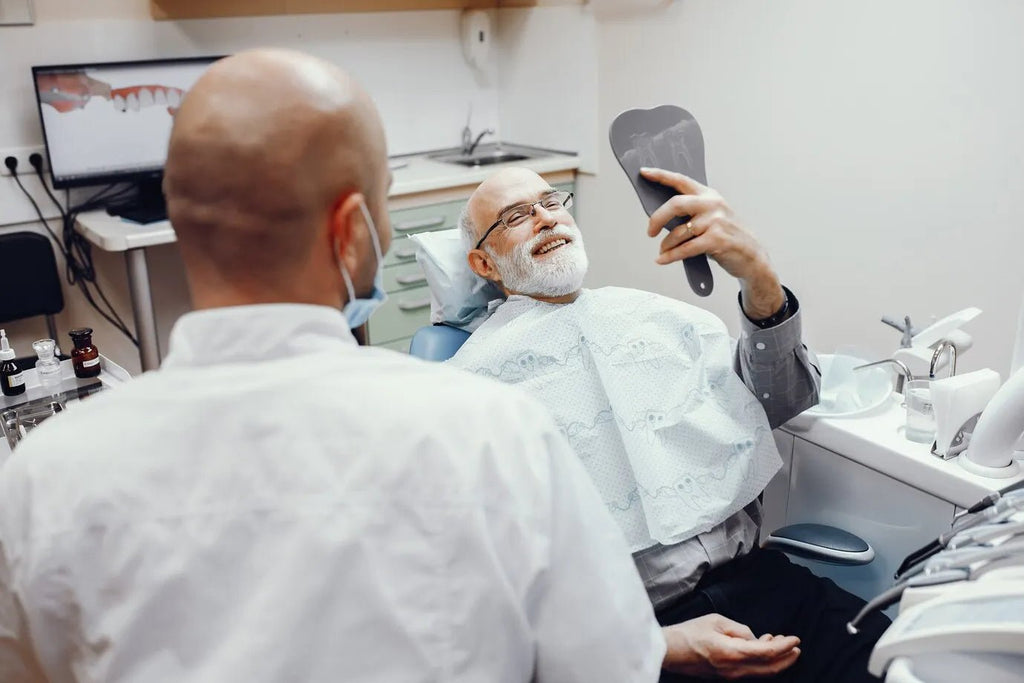
What instrument must a dentist have for a basic exam?

Essential Dental Instruments for a Basic Exam – A Simple Guide
Have you ever sat in a dentist’s chair and wondered, “What are all these metal tools for?” or “What instrument must a dentist have for a basic exam?”. Dentists don’t just look at your teeth; they use special instruments to check for cavities, gum problems, and other issues that you may not even notice.
If you’re a dentist, clinic owner, or someone curious about dental tools, this guide will explain each instrument in the simplest way possible. By the end, you'll know what these tools do and why they’re important for a basic dental checkup.
1. Mouth Mirror – The Dentist’s Second Set of Eyes
A small, round mirror attached to a metal handle.
What does it do?
· It helps the dentist see inside your mouth without having to bend or twist.
· It reflects light to make dark areas inside your mouth brighter.
· It gently moves your cheeks and tongue out of the way so the dentist can see everything clearly.
Why is it important?
Without this tool, a dentist would have to bend their neck awkwardly to see the back of your teeth. It makes their job much easier!
Example:
Imagine using a small mirror to check the back of your hair in a salon. The mouth mirror works the same way it helps the dentist see hidden areas inside your mouth.
2. Dental Explorer (Probe) – The Tooth Detective
A thin, pointed metal tool that dentists use to check for cavities.
What does it do?
· It feels for soft spots on the teeth, which may indicate a cavity.
· It scrapes away plaque to see if there’s decay underneath.
Why is it important?
A cavity often starts so small that it’s invisible to the eye. This tool helps detect decay before it gets worse.
Example:
Imagine you’re checking a wooden table for cracks. You run your fingers over it and feel a rough or weak spot that’s what a dental explorer does for teeth!
3. Periodontal Probe – Checking the Gums
A long, thin tool with markings on it (like a small ruler).
What does it do?
· It measures the space between your teeth and gums to check for gum disease.
· If the gum space (pocket) is too deep, it could mean gum infection.
Why is it important?
Healthy gums hold teeth firmly in place. If the gums start pulling away, it could lead to loose teeth or even tooth loss. This tool helps catch gum problems early.
Example:
Imagine using a dipstick to check the oil in a car. The periodontal probe does the same thing—it measures the depth of gum pockets to check for problems.
4. Cotton Pliers (Tweezers) – The Dentist’s Helper
A pair of long, thin tweezers.
What does it do?
It picks up cotton rolls, gauze, or other small tools inside your mouth.
Why is it important?
Dentists can’t use their fingers to pick up materials because it wouldn’t be hygienic. Tweezers help them keep everything clean and germ-free.
Example:
Think of using tweezers to pick up a tiny object that your fingers can’t grab. Dentists use these for the same reason to grab small things inside your mouth!

5. Air-Water Syringe – Washing & Drying Teeth
What is it?
A small spray tool that blows air and sprays water into your mouth.
What does it do?
· It washes away food bits and plaque from your teeth.
· It dries the teeth so the dentist can check them properly.
Why is it important?
Imagine trying to check a wet window for scratches—it’s hard to see clearly. The air-water syringe dries the teeth, so the dentist can examine them without distraction.
Example:
Think of rinsing dirty dishes with water and then using a fan to dry them. This tool does both for your teeth!
6. Dental Scaler – The Plaque & Tartar Remover
A hook-shaped metal tool used to scrape off hard plaque (tartar) from teeth.
What does it do?
· It removes stubborn plaque that brushing can’t get rid of.
· It prevents gum disease by keeping teeth clean.
Why is it important?
If plaque stays too long, it hardens into tartar, which can cause bad breath, gum disease, and even tooth loss.
Example:
Think of scraping burnt food off a pan. The scaler does the same thing for tough buildup on teeth.
7. Saliva Ejector – The Tiny Vacuum for Your Mouth
What is it?
A soft, bendable suction tube.
What does it do?
· It sucks out extra saliva while the dentist is working.
· It keeps the area dry for better visibility.
Why is it important?
Excess saliva can make procedures harder. This tool helps dentists work comfortably without stopping too often.
Example:
Imagine using a vacuum cleaner to remove water spills. This tool does the same thing—but for your mouth!
FAQs – Your Questions Answered!
Q.1: What are the most commonly used dental instruments?
The basic ones include a mouth mirror, dental explorer, periodontal probe, tweezers, air-water syringe, scaler, and saliva ejector.
Q.2: How often should dental instruments be sterilized?
After every patient! This keeps the tools germ-free.
Q.3: Why do dentists use a scaler if I brush my teeth daily?
Because plaque hardens over time, and a toothbrush can’t remove it all.
Final Thoughts - Why Quality Dental Tools Matter
A dentist can’t do their job properly without these basic instruments. High-quality tools help detect problems early, keep teeth clean, and ensure better patient care.
Need Reliable Dental Instruments?
We provide high-quality dental tools in bulk at affordable prices.
👉 Explore Our Dental Instruments Collection













